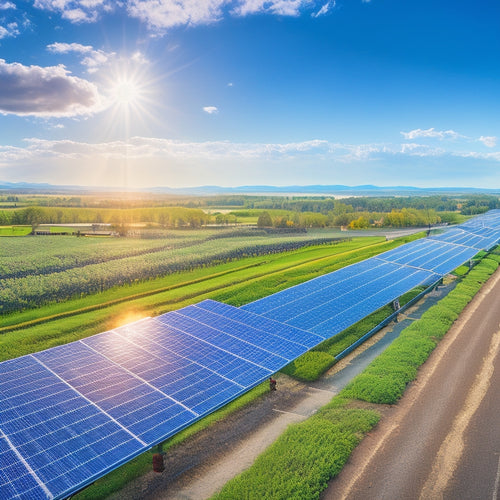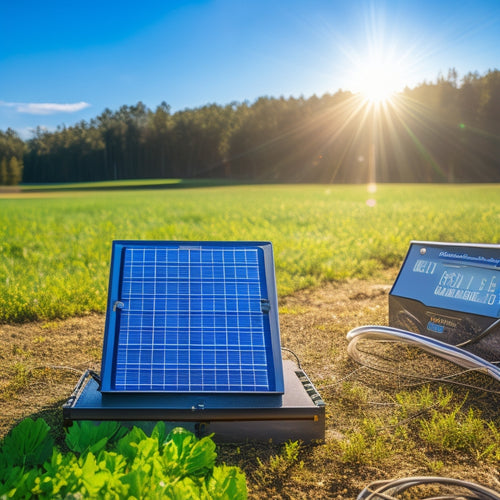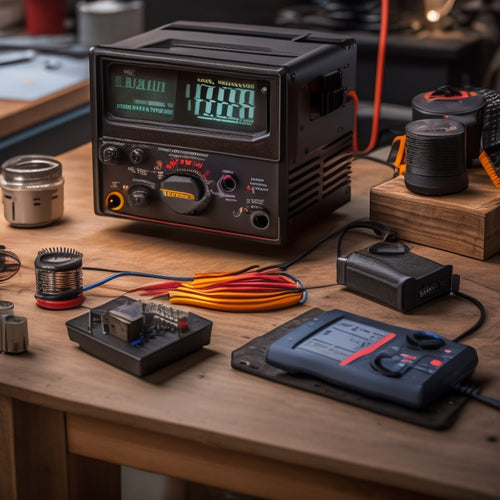
Achieve Energy Freedom at Home
Share
By integrating renewable energy sources, such as rooftop solar panels, and advanced energy storage systems, you can achieve energy freedom at home, reducing your reliance on the grid and taking control of your energy bills. This setup enables you to generate clean energy, store excess energy for later use, and even provide backup power during outages. With smart technology, you can effortlessly switch between renewable sources and the grid, maintaining energy resilience and consistency. As you continue to investigate the ins and outs of energy independence, you'll access even more opportunities to optimize your energy usage and maximize your savings.
At a Glance
- Residential solar panels and home solar battery systems enable energy independence and reduce reliance on the grid.
- Energy audits and smart technology help identify areas for improvement, monitor energy consumption, and optimize energy usage.
- Integrating renewable energy sources, energy storage systems, and advanced battery management ensures a reliable power supply during low production.
- Energy-efficient HVAC systems, insulation improvements, and programmable thermostats reduce energy waste and costs, increasing disposable income.
- Achieving energy freedom at home requires calculating daily energy usage, monitoring consumption patterns, and selecting higher efficiency energy storage solutions.
Cut Reliance on Grid
You're likely tired of relying on the grid for your energy needs, and you're not alone.
Cutting your reliance on the grid can bring you closer to energy freedom, and it's more achievable than you think. By integrating a battery storage system into your solar setup, you can store excess energy generated during the day to use at night or during power outages, reducing your dependence on the grid.
This means you'll have more control over your energy bills and gain protection from grid outages and fluctuations.
Grid Independence Now
Cutting the cord from the grid is no longer a futuristic fantasy, but a tangible reality, thanks to advancements in renewable energy technologies and energy storage systems. You can now utilize power from renewable sources like solar, wind, and hydro to fuel your home.
With sustainable solutions like off-grid systems, you'll reduce your reliance on the grid and enjoy energy independence. Take advantage of solar incentives and invest in energy alternatives that not only benefit the environment but also your wallet.
Off-grid solar power systems renewable energy solutions can provide an extensive solution for a smooth changeover to off-grid energy independence, addressing concerns about complexity, upfront costs, and durability.
To guarantee a smooth changeover, consider backup generators and advanced battery technology to store excess energy. This way, you'll have a reliable supply of power even during outages or periods of low energy production.
By adopting eco-friendly practices, you'll not only reduce your carbon footprint but also create a smart home that's self-sufficient and efficient.
With grid independence, you'll have the freedom to live life on your terms, without worrying about rising energy costs or grid outages. It's time to take control of your energy needs and join the movement towards a more sustainable future.
Reduce Utility Bills
Break free from the shackles of hefty utility bills by utilizing the power of off-grid energy solutions. You can reduce your reliance on the grid and lower your energy expenses by implementing a combination of energy-efficient strategies.
Start by conducting an energy audit to identify areas of improvement in your home. This will help you pinpoint opportunities to upgrade to renewable sources, such as solar panel installation for homes, and optimize your energy management system.
By installing rooftop solar panels, you can greatly lower your monthly electricity bills by capturing free, renewable energy from the sun. Invest in smart technology that enables usage tracking and real-time monitoring, allowing you to make data-driven decisions about your energy consumption.
Take advantage of solar incentives and utility programs that offer rebates for energy-efficient home upgrades. Improve your home's insulation to reduce heat loss and energy waste.
Saves Money on Bills
By generating your own energy at home, you'll lower your expenses by reducing your reliance on the grid and avoiding peak-hour rates.
With the help of efficient and durable house solar panels, you can maximize your energy output and reduce your energy waste.
You'll also reduce energy waste by optimizing your energy usage and eliminating standby power consumption.
As a result, you'll see significant savings on your energy bills, putting more money back in your pocket.
Lower Your Expenses
About 75% of your energy bill is consumed by heating and cooling your home, making it the largest expense. By optimizing your heating, ventilation, and air conditioning (HVAC) system, you can greatly reduce your energy consumption and lower your expenses.
Installing a programmable thermostat allows you to regulate your home's temperature when you're not there, saving you up to $150 annually.
Moreover, consider energy-efficient HVAC systems, such as heat pumps or radiant floor heating, which can provide cost-effective alternatives to traditional systems. You can also investigate energy alternatives like solar panels, which can power your HVAC system and reduce your reliance on the grid.
In addition, regular maintenance of your HVAC system can help prevent energy waste and extend its lifespan, leading to additional cost reduction.
Reduce Energy Waste
Efficiency is the cornerstone of energy freedom, and reducing energy waste is an essential step in achieving it. You can start by conducting an energy audit to identify areas of inefficiency in your home. This will help you pinpoint opportunities for waste reduction and guide your efforts towards making targeted behavior changes.
Invest in smart technology that allows you to monitor your energy consumption habits in real-time. This will enable you to make informed lifestyle adjustments and optimize your energy usage.
Insulation improvements can also go a long way in reducing heat loss and heat gain, thereby minimizing your reliance on energy-intensive heating and cooling systems.
Consider integrating renewable energy sources, such as solar or wind power, into your energy mix. This won't only reduce your energy waste but also decrease your dependence on non-renewable energy sources.
Inverter Synchronizes Energy Flow
You'll appreciate how your inverter seamlessly synchronizes energy flow, ensuring a smooth power shift from the grid to your home's energy storage system.
With the ability to optimize energy distribution, your inverter can maximize the use of renewable energy sources, such as those provided by off-grid solar systems, and reduce your reliance on the grid.
This sophisticated technology enables efficient energy distribution, maximizing your energy independence and freedom.
Smooth Power Transition
Your inverter's synchronization capability guarantees a seamless power changeover between your renewable energy source and the grid, assuring a consistent flow of electricity to your home.
This smooth shift is vital for maintaining energy resilience and guaranteeing that your home remains powered even during grid outages. With smart technology integrated into your power management system, you can effortlessly switch between your sustainable energy sources and the grid, optimizing your energy usage and reducing your reliance on fossil fuels.
As you generate renewable energy, your inverter synchronizes the energy flow, allowing you to store excess energy in your battery technology for later use.
This load balancing feature guarantees that your home's energy needs are met efficiently, reducing energy waste and saving you money. By conducting regular energy audits, you can identify areas of improvement and optimize your home automation system to maximize your energy independence.
With a smooth power shift, you can enjoy the freedom and security that comes with having a reliable and sustainable energy system.
Efficient Energy Distribution
As your home's energy system adapts to changing power needs, the inverter plays an essential role in synchronizing energy flow. It guarantees that your smart home's energy management system can efficiently distribute power from renewable sources, such as solar or wind, to meet your energy demands.
The inverter's advanced energy monitoring capabilities enable it to track your energy usage patterns and respond accordingly, optimizing energy efficiency and reducing waste.
The inverter's demand response feature allows it to adjust power output in real-time, balancing your energy load to prevent grid overload. This load balancing capability guarantees that your home's energy system operates within a stable and efficient range, reducing the strain on the grid and your energy bills.
By optimizing power flow, the inverter helps you achieve energy freedom at home, reducing your reliance on the grid and minimizing your carbon footprint.
With efficient energy distribution, you can enjoy a more sustainable, self-sufficient, and cost-effective energy management system that puts you in control of your energy future.
Assess Your Power Requirements
You need to determine your daily energy usage to understand how much power you require from your off-grid system.
To do this, calculate the total wattage of your appliances and their individual power needs, including startup surges and continuous operation.
Consider utilizing residential solar panels to generate clean energy and reduce your reliance on the grid.
Additionally, incorporating a home solar battery system(https://www.illchanterlater.com) will allow you to store excess energy for later use.
This assessment will help you size your system accurately and guarantee it meets your energy demands.
Daily Energy Usage
Daily energy usage is the foundation of energy freedom at home, and evaluating your power requirements is the crucial first step. To achieve energy independence, you need to understand how much energy you use daily. This involves monitoring your energy usage patterns to identify areas of inefficiency and opportunities for improvement.
Start by tracking your energy usage over a period of time, ideally a month, to get a clear illustration of your daily energy needs. You can use energy monitoring devices or smart meters to collect data on your energy consumption.
Analyze your usage patterns to identify peak hours, energy-intensive appliances, and seasonal variations. This information will help you determine the size of the energy system you need to power your home.
Appliances Power Needs
To guarantee a reliable energy system, identifying the power requirements of your appliances is essential.
You'll need to evaluate the power needs of each device to determine the total energy load. Start by making a list of all your appliances, including energy efficient ones, and their respective wattage ratings. This information can usually be found on the appliance's nameplate or in the user manual.
Next, calculate the total power requirement by adding up the wattage of each appliance. Consider the maximum power draw of each device, as some appliances may have varying power needs depending on their operation. For instance, a refrigerator's power consumption may increase during defrosting cycles.
Smart home technology can also help you monitor and manage your energy usage.
Consider investing in smart plugs or a home energy monitoring system to track your appliances' power consumption in real-time. This data will enable you to optimize your energy usage, identify areas for improvement, and guarantee your energy system can meet the power demands of your appliances.
Higher Efficiency Energy Storage
When you're looking to maximize your energy independence, you need energy storage systems that can keep up.
That's why you should focus on higher efficiency energy storage solutions that offer a longer cycle life, allowing you to store and reuse energy more effectively.
With a longer cycle life, you'll reduce your energy waste and extend the lifespan of your system.
Longer Cycle Life
With the advent of renewable energy sources, homeowners like you're now more than ever concerned about efficiently storing excess energy for later use.
When it comes to energy storage, one vital aspect is the battery's cycle life. A longer cycle life means your energy storage system can charge and discharge more times, resulting in a higher return on investment.
You want a battery that can withstand the rigors of daily use, providing a reliable source of power when you need it most.
A longer cycle life translates to lower maintenance costs, reduced waste, and a smaller environmental footprint.
Look for energy storage systems with advanced battery management systems that optimize charging and discharging cycles, ensuring your battery lasts longer.
Frequently Asked Questions
Can I Add More Solar Panels to My System Later?
You can add more solar panels to your system later, but you'll need to verify solar panel compatibility and consider installation constraints, such as available roof space, electrical capacity, and potential upgrades to your inverter and mounting system.
How Long Does the Installation Process Typically Take?
Fasten your seatbelts, Buttercup! The installation process typically takes 2-5 days, depending on the installation timeline and factors like roof size, panel quantity, and local permits - but don't worry, you'll be utilizing sunshine in no time!
Are Energy Storage Systems Safe for My Family?
You'll be relieved to know that energy storage systems are designed with battery safety in mind, ensuring your family's security isn't compromised, as they're built with multiple layers of protection and rigorous testing to prevent electrical shock or fire hazards.
Can I Still Use My Appliances During a Blackout?
During a blackout, you can still power essential appliances using your energy storage system, or consider appliance alternatives like portable generators or solar-powered options, ensuring blackout preparedness and minimizing disruptions to your daily life.
Will My System Still Work During a Power Outage?
During a power outage, you'll stay energized with a solar backup system, providing reliable outage solutions. This means you'll still have power when the grid fails, ensuring your essentials remain operational, and you're not left in the dark.
Explore More
As you take the reins of your energy future, remember: "Well begun is half done." You've made a significant step towards energy freedom at home by cutting reliance on the grid, saving money on bills, and synchronizing energy flow with an inverter. By evaluating your power requirements and choosing higher efficiency energy storage, you're well on your way to a self-sufficient tomorrow. Now, it's time to reap the benefits of your labor and enjoy the freedom that comes with being your own energy provider.
Related Posts
-

Applications of Photovoltaic Systems
Photovoltaic systems are versatile, converting sunlight into electricity for various applications. You can use them i...
-

Choosing the Right Solar Power Charge Controller
Choosing the right solar power charge controller is crucial for maximizing energy efficiency and extending battery li...
-

Key Features of a DC to AC Converter
A DC to AC converter features high efficiency and conversion rates, which reduce energy costs and improve performance...


